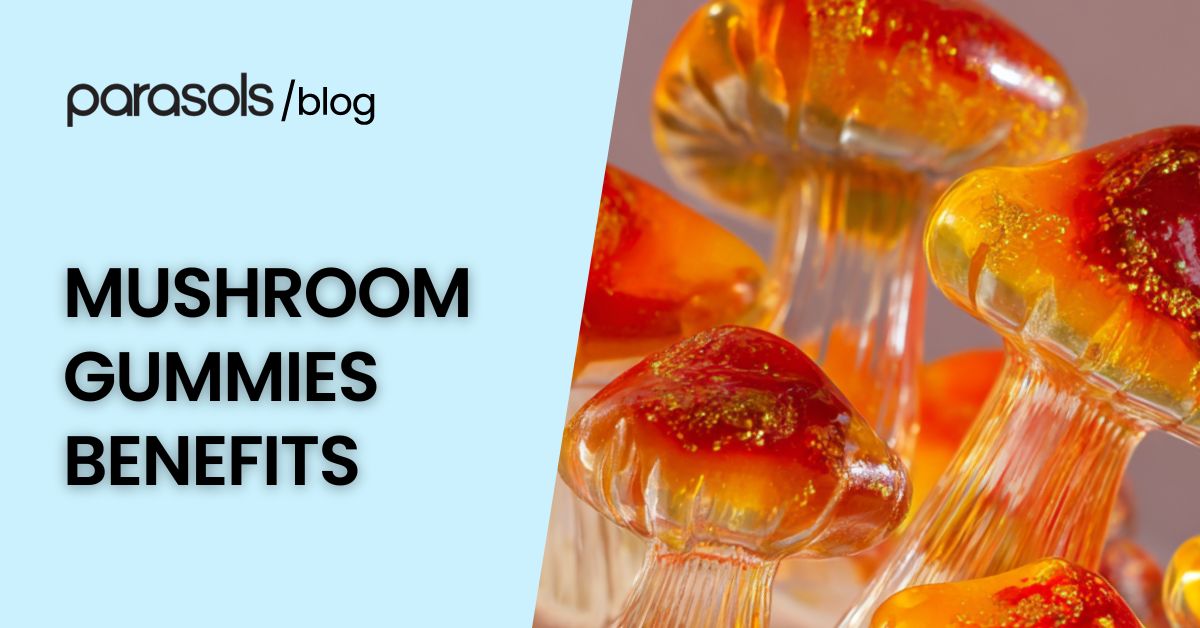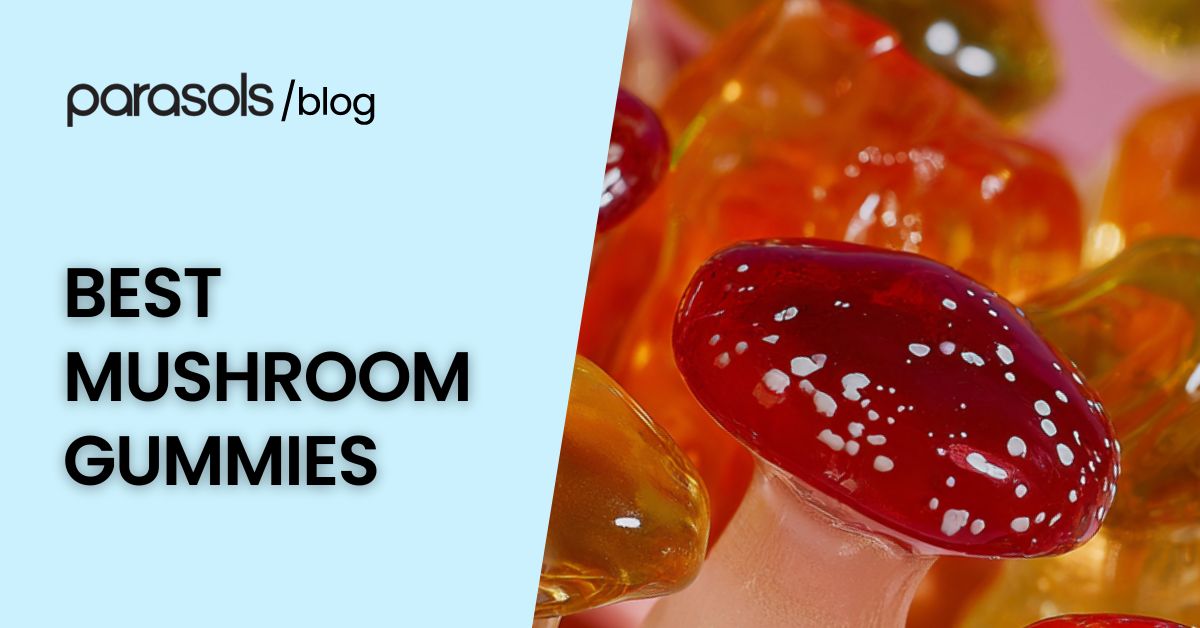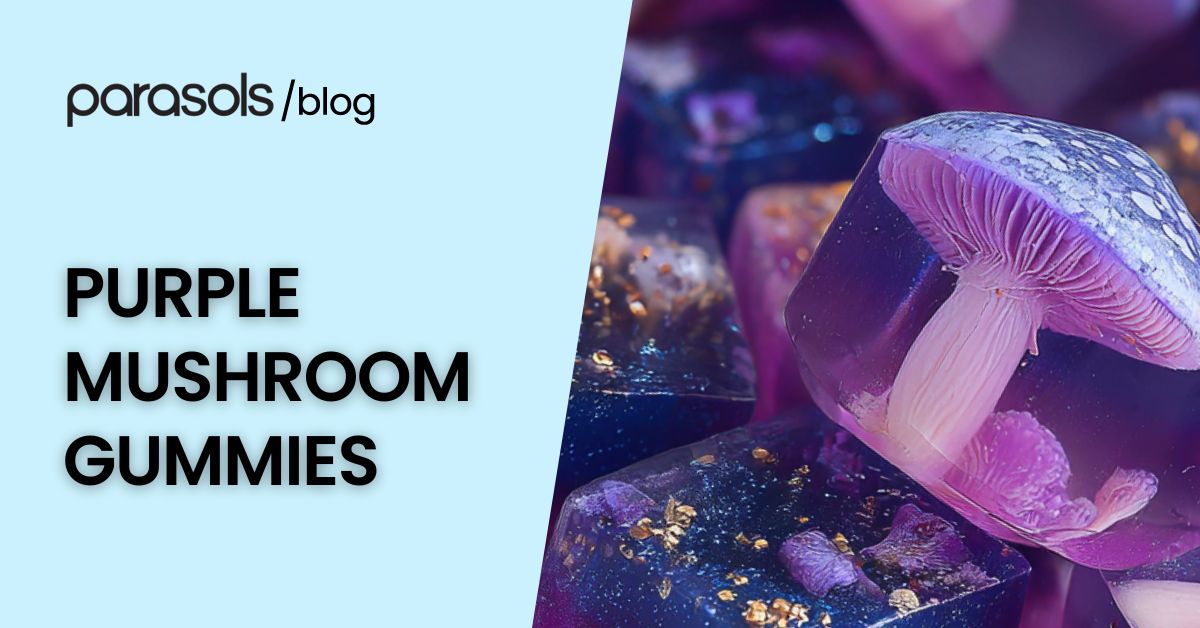In recent years, mushroom gummies have exploded in popularity as an alternative tool for managing mental health conditions like PTSD, depression, anxiety, and substance use disorder. With the increased legislative attention to psychedelics—14 states introduced bills on psilocybin in 2023 and five passed them—there’s growing interest in the medical applications of mushrooms, particularly in edible formats like gummies.
But is this trend just another wellness fad, or do mushroom gummies actually offer surprising benefits? And more importantly, are they safe? This blog breaks down the claimed mushroom gummies benefits, real risks, and safe alternatives to mushroom gummies.
What Are Magic Mushroom Gummies?
Magic mushroom gummies are chewy edibles infused with mushroom extracts, typically for microdosing purposes. Parasols offer high quality mushroom gummies like our pineapple non detect shroom gummies. They are intended to make psychedelic experiences more palatable, replacing the bitter taste of raw mushrooms with fruity flavors like strawberry, mango, or blue raspberry in gummy form. These gummies may contain psychedelic compounds like psilocybin or muscimol (from functional mushrooms). Amanita muscaria) or non-psychedelic varieties like reishi or cordyceps, which are also considered functional mushrooms.
There are two main categories of mushroom gummies:
- Psychedelic mushroom gummies: Typically infused with psilocybin or muscimol, and used for microdosing to examine the benefits of mushroom gummies.
- Nootropic mushroom gummies: Contain legal, non-psychedelic mushrooms like lion’s mane, reishi, cordyceps, and turkey tail, and are marketed as dietary supplements for brain health.
Potential Benefits of Mushroom Gummies
Despite the lack of comprehensive scientific research, many users report the following benefits:
1. Mood Regulation
Microdosing psilocybin has been linked anecdotally to reductions in depression and anxiety. Some users claim that even small, sub-perceptual doses of psilocybin help them feel more emotionally stable and less prone to anxiety attacks.
2. Improved Cognitive Function
Lion’s mane and cordyceps mushrooms, commonly used in nootropic blends, are often marketed as brain-boosters. They’re believed to support mental clarity, enhance focus, and even stimulate nerve growth.
3. Stress Relief and Relaxation
Reishi mushrooms are well known for their adaptogenic properties, helping the body manage stress. Gummies containing reishi are often marketed to reduce fatigue and improve sleep quality.
4. Energy and Physical Endurance
Cordyceps mushrooms may help with energy production and stamina, which is why they are frequently used by athletes or those seeking natural energy boosters.
5. Support for Immune Health
Turkey tail mushrooms are rich in antioxidants and have shown potential immune-boosting effects, leading to their inclusion in many nootropic mushroom blends.
The Dark Side of Mushroom Gummies

Despite their promising benefits, there are significant risks tied to consuming mushroom gummies—especially those purchased from unlicensed or unregulated vendors that do not guarantee the benefits of mushroom gummies.
1. Unregulated Ingredients and Doses
Many mushroom gummies sold online lack quality control. Ingredients may not be accurately labeled, and dosing can vary wildly. This inconsistency can lead to overdosing or exposure to harmful substances.
The Blue Ridge Poison Center has reported multiple cases of illness due to unregulated mushroom gummies, highlighting the public health threat they pose to overall health.
2. Presence of Toxic Mushrooms
Some gummies contain Amanita muscaria instead of psilocybin. While legal, these mushrooms are toxic. They contain muscimol, which can cause hallucinations, nausea, agitation, seizures, and even death in large doses.
3. Risk to Children
Mushroom gummies can easily be mistaken for candy. There have been documented cases of children accidentally consuming them, resulting in severe health issues—including kidney failure and hospitalizations.
4. Scam and Fraud
Many vendors operate through social media, chat apps, or obscure websites. Buyers frequently report receiving counterfeit or ineffective products—or worse, being scammed altogether.
5. No Medical Oversight
Without legal or medical frameworks in place, users often self-dose without knowing how much of the active ingredient they are consuming. This opens the door to misuse, adverse reactions, and long-term mental health consequences.
Microdosing: Science vs. Speculation
Microdosing, or taking sub-hallucinogenic doses of psilocybin (.1–.5 grams), is one of the more popular uses of mushroom gummies. Proponents say it enhances creativity, reduces anxiety, and boosts productivity.
However, scientific backing is still thin. While some peer-reviewed studies show promise, most evidence remains anecdotal. In addition, no standards exist for safe dosing, and serotonin-based medications (like SSRIs) can interfere with psilocybin’s effects, which may impact overall health.
Legal and Regulatory Considerations
In the U.S., psilocybin and psilocin are classified as Schedule I substances, making them illegal under federal law. However, certain states have decriminalized or allowed them for medical research.
Amanita muscaria is not federally scheduled, but it's not FDA-approved for consumption. Gummies containing this mushroom are often sold legally, despite their risks.
Most mushroom gummies—whether psychedelic or nootropic—are unregulated by the FDA, leaving room for inaccurate labeling and unsafe manufacturing processes.
The Safer Alternative: Legal Nootropic Mushroom Gummies
For those curious about the mental health benefits of mushrooms without the risk of psychedelic side effects, legal mushroom supplements might be worth examining. These products typically include:
- Lion’s Mane is known for its potential benefits for brain health.: Potentially supports nerve growth and cognitive function, enhancing brain health.
- Reishi: Promotes calmness and sleep.
- Cordyceps: Enhances energy and physical stamina, contributing to overall health.
- Turkey Tail: Supports the immune system.
These mushrooms are natural, legal, and generally safe, though their benefits are still being studied. They’re not miracle cures, but they are far less risky than unregulated psychedelics.
Risks of Self-Medicating

Using mushroom gummies as a form of self-medication—especially for mental health or substance abuse—can be dangerous. Risks include:
- Misdiagnosis or mistreatment
- Drug interactions with medications
- Exacerbation of psychiatric symptoms
- Development of dependence or psychosis
Self-medication bypasses professional medical advice, and the consequences can be devastating. There are safer and more effective options available.
The Bottom Line
Mushroom gummies are marketed as everything from mood boosters to cognitive enhancers to psychedelic healing tools. While some benefits may exist, the risks—particularly with unregulated, online-sold products—are substantial.
If you’re struggling with depression, anxiety, or substance use, the answer isn’t necessarily a psychedelic gummy. It’s a structured, supervised recovery plan that can include evidence-based therapy and professional guidance for overall health.
FAQs About Mushroom Gummies
Are mushroom gummies legal in the U.S.?
Psilocybin-infused gummies are illegal under federal law but may be allowed in limited state-sanctioned research settings. Nootropic mushroom gummies are legal and widely available.
Do mushroom gummies get you high?
Only if they contain psychoactive substances like psilocybin or muscimol. Nootropic gummies do not cause a high.
Can you microdose with mushroom gummies?
Yes, some people use mushroom gummies for microdosing, but the lack of regulation makes consistent dosing unreliable and potentially unsafe.
Are mushroom gummies safe for kids?
No. There have been cases of accidental ingestion by children resulting in hospitalization. These products should always be stored securely.
What are nootropic mushroom gummies?
These are supplements that contain legal, non-psychedelic mushrooms like lion’s mane or reishi. They’re marketed for mental clarity, energy, and mood enhancement, showcasing how mushroom gummies work.



Leave a comment
This site is protected by hCaptcha and the hCaptcha Privacy Policy and Terms of Service apply.